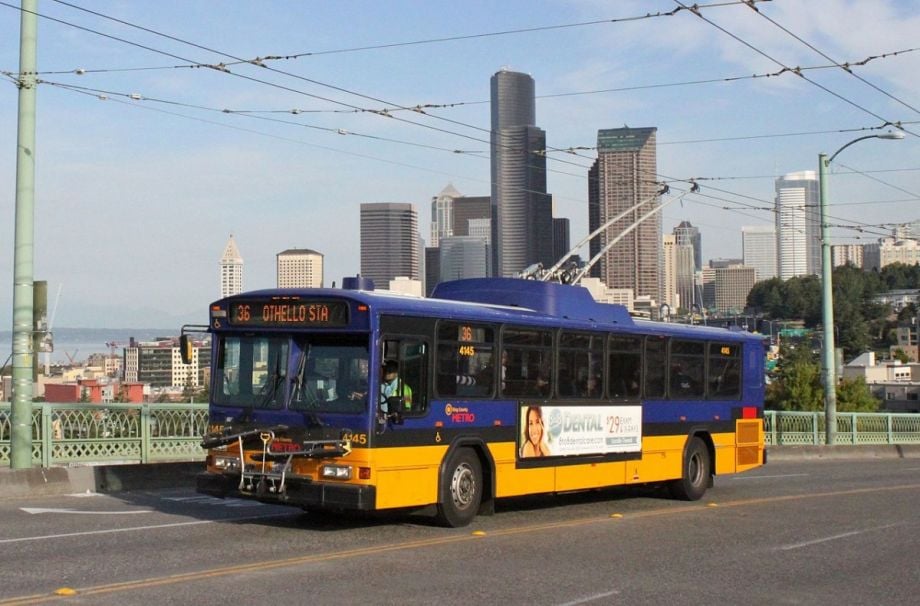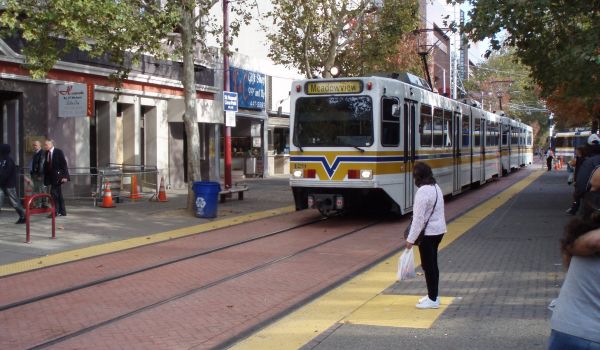It’s unlikely there’s a soul in Seattle who thinks the city’s bus system is great. If you’re commuting to or from downtown at rush hour, riding the bus can be fairly quick, though usually it’s shoulder-to-shoulder crowded. If you’re riding it at off-peak hours or from neighborhood to neighborhood, service is often infrequent and inconvenient.
This is not a knock on King County Metro. Like most American transit agencies, Metro is woefully underfunded. Seattle’s Transit Riders Union (TRU), a nonprofit advocacy group, wants to be part of the funding solution. Or, more to the point, they want Seattle’s businesses to be part of the solution by reinstating an employee hours tax (EHT) that they say could provide as much as $20 million to $30 million in additional funding each year.
An EHT requires employers to pay an annual fee for every employee they have on staff. TRU’s vision is a $50-$80 fee per employee. The cost would be based on congestion zones with businesses in the congested downtown core paying the most. Small businesses under a certain tax threshold would be exempt. TRU says the money would best be spent on capital improvements to the city’s bus rapid transit system.
“We need to use every option we have,” says Katie Wilson, TRU general secretary. “We can’t be complacent about [the economy] doing well and we can’t keep raising sales tax, car tab fees and fares.”
Nearly half of Metro’s funding comes from sales tax revenues. Thanks to the Great Recession and a slow recovery, Metro’s funding dipped well into the red. Seattle was able to stave off major service cuts with a voter-approved .1 percent sales tax increase and raising car registration fees from $20 to $60 each year. In addition Metro changed its reserve fund policy to allow for more money spent on service and less on savings.
The Great Recession also killed Seattle’s previous version of the EHT — or at least it was used as an excuse for businesses to pressure city council and the mayor to kill it. Passed in 2006 at the same time as a nine-year, $365 million property tax levy, the first EHT was much smaller. It charged businesses $25 per employee per year, with exemptions for employees who carpooled or didn’t drive to work. It was projected to only raise about $5.5 million per year and was repealed in 2009.
“Seattle’s economy is now ostensibly doing really well, at least on the business side,” says Wilson. “It opens the door politically to say, OK, time for employers to be contributing a little more.”
She thinks it’s only fair for businesses to help pay for the transit system their employees need and are going to need even more as Seattle’s population continues to rapidly grow.
“Public transit gets workers to work. They can’t do what they do as a business if the roads are clogged up,” Wilson says.
She continues, “At some point it becomes a matter of not just fairness, but that if Seattle keeps growing at the rate it’s growing we just cannot put tens of thousands of more cars on the road. That’s going to affect businesses as much as any of us so asking them to step up and contribute is highly reasonable.”
Don Blakeney is vice president of advocacy and economic development for the Downtown Seattle Association, one of the groups who fought to get the last EHT repealed. He agrees that transit is critical for businesses and cities, but says businesses are already paying and paying a lot.
“Access and mobility are an essential part of affordability and key to the health of our city, both from an economic perspective as well as a quality of life perspective,” says Blakeney. “It’s well understood that businesses currently pay a good portion of the property tax in Seattle through their building rents.”
According to him, a single office building can generate $350,000 in property taxes alone. He also says downtown as a whole generates over $300 million in taxes annually. Granted, that’s a collective contribution, not how much any individual business is paying and only a portion of it is for transit funding. But Blakeney says that funding is far fairer than a tax that’s just for businesses.
“To create a new line-item tax on employers sends the wrong message that Seattle is unpredictable and ‘anything goes’ from a tax perspective,” he says. “This would essentially be double-dipping, and opens the door for a divisive conversation that singles out the business community.”
Wilson says rather than being less fair, one of the EHT’s selling points is that it is a progressive tax. Because Washington lacks an income tax and has a high sales tax, its funding mechanisms are notoriously regressive (meaning they tax away a greater percentage of low-income earners’ money than high-income earners). The Institute on Taxation and Economic Policy recently named Washington’s tax system the most regressive in the country, taxing the poorest residents at 16.8 percent versus the top 1 percent at only 2.4 percent.
She’s hoping that’s a selling point that could get Seattle residents on board with the EHT. “We’re going to slap people with a big property tax and last year it was car tabs and sales tax, maybe people will be excited about getting businesses to contribute.”
That big property tax Wilson mentions certainly complicates things. The 2006 levy expires at the end of the year. Seattle will vote on whether to pass its replacement, a massive nine-year, $930 million property tax called Move Seattle (which, Blakeney points out, his organization supports).
But, the EHT Wilson envisions wouldn’t go to a public vote. She admits, “It would be more difficult if it did.”
The EHT just needs a majority vote from city council. But that too could prove tricky. Council Member Nick Licata proposed an EHT and commercial parking tax last spring as a way to reduce Move Seattle’s property tax. That proposal lost 2-7, but Wilson says more council members have since expressed support for EHT.
Wilson and her Transit Riders Union colleagues are hoping to get the council to approve funding for an EHT study this year and potentially vote on implementation as soon as next year.
The Works is made possible with the support of the Surdna Foundation.

Josh Cohen is Crosscut’s city reporter covering Seattle government, politics and the issues that shape life in the city.
Follow Josh .(JavaScript must be enabled to view this email address)

















